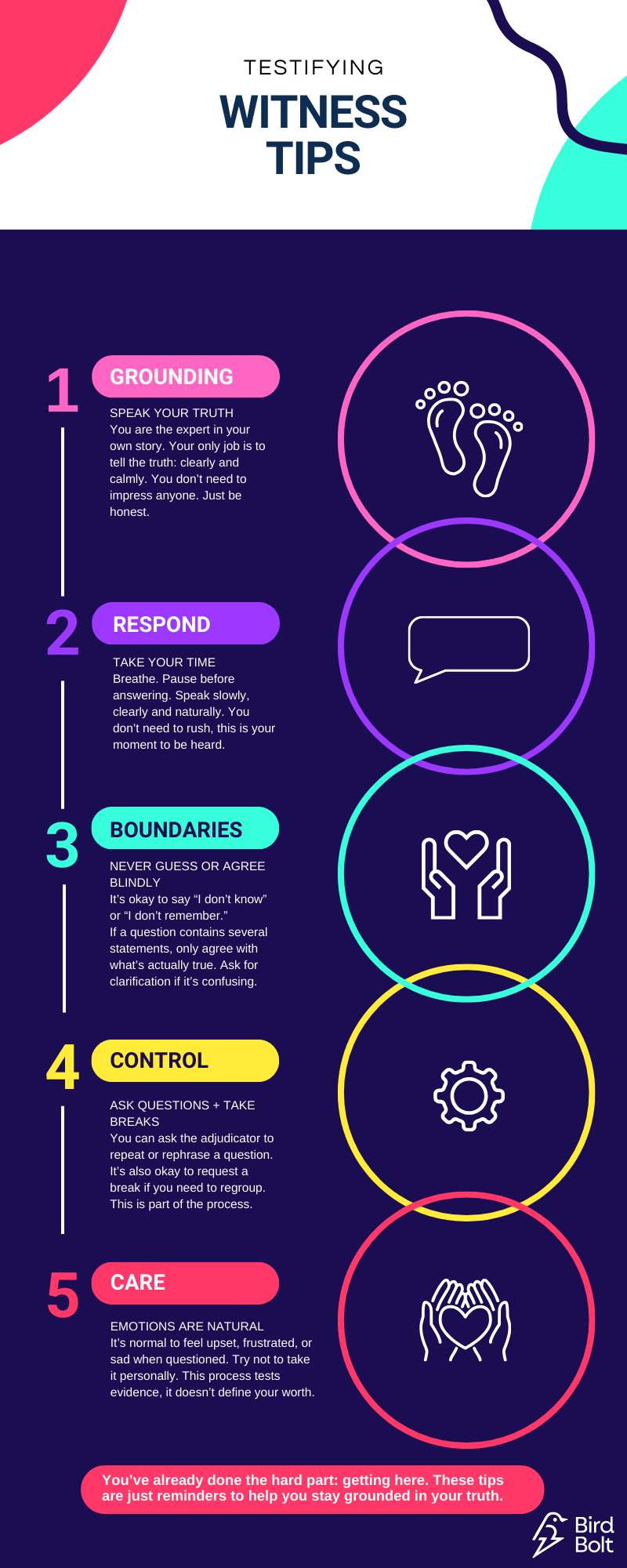Preparing to Testify: What to Expect and How to Feel More Confident in Court or a Hearing
Testifying in court can be an intimidating, anxiety-inducing experience—especially if you've never done it before or if you're testifying about something deeply personal, traumatic, or stressful. You might feel overwhelmed, worried you'll say the wrong thing, or fear that you won't be believed. If you're feeling this way, know that you’re not alone. This post will walk you through exactly what to expect and how you can best prepare yourself for giving testimony, helping you feel confident, calm, and empowered when it's your turn to speak.
Why is Testimony So Important?
Testimony is more than simply sharing your story; it's a critical form of evidence that helps judges, adjudicators or juries decide the truth. In our justice system, oral evidence from witnesses often becomes the decisive factor in a case. While documents, videos, and other types of evidence matter, it is often your testimony, and the lived experience, that brings clarity to what happened.
Historically, testimony has always held a special status in law because the legal system recognizes the human voice as uniquely powerful. Judges listen carefully not just to what witnesses say, but also how they say it. Your words can shape not only the outcome of a case but also how the broader community understands important issues, like discrimination, abuse, or violence.
How Will My Credibility be Evaluated?
One thing witnesses often worry about is whether they’ll be believed. Courts assess credibility by carefully examining several key factors, including:
Consistency: Do your answers remain consistent over time? Small, natural variations are normal, but major contradictions may impact credibility.
Memory: How clearly do you recall the events? It’s completely acceptable to not remember everything, especially minor details.
Clarity and Honesty: Do your answers come across as genuine and truthful? Being straightforward, even admitting uncertainty or mistakes, can strengthen your credibility.
Body Language and Demeanour: While less important than it used to be, how you present yourself still matters. Staying calm and composed is helpful, but courts also recognize the stress involved.
Motive: Is there any reason you might misrepresent events? If not, this usually helps your credibility.
Judges know that people are human and may not remember everything perfectly. Credibility isn’t about being perfect; it’s about being truthful and authentic.
Dealing with the Emotional Impact of Testifying
Giving testimony about personal experiences, especially trauma, is profoundly emotional. You may feel exposed, vulnerable, or even re-traumatized by recounting your experiences. Sometimes being cross-examined, where another lawyer questions you rigorously, can feel aggressive or personal, as though your integrity is being challenged.
It's important to know:
These feelings are normal: Feeling angry, upset, or anxious during questioning doesn't make your testimony less credible.
It's not personal: Lawyers ask tough questions not because they necessarily doubt you, but because their role is to test the truth thoroughly.
It can be empowering: Many witnesses find a deep sense of validation and relief in having their story heard publicly, especially when the person who harmed them must listen.
Testifying can become an important step in healing because your voice is heard, acknowledged, and recorded as part of the official story.
Key Tips for Effective and Confident Testimony
To make your testimony as clear, credible, and impactful as possible, remember these important tips:
1. Take Your Time
Pause before answering each question. This helps you organize your thoughts clearly and reduces the chance you'll misspeak out of nervousness.
2. Always Speak the Truth
Don't exaggerate or minimize events. Honesty, even about small details, matters significantly.
3. Don't Guess
If you don't know or can't remember, just say so. "I don’t know" or "I can’t remember" are perfectly acceptable answers.
4. Ask for Clarification
Lawyers sometimes ask confusing questions. If you don't understand, politely ask them to rephrase. For example, if they say, "I put it to you that the sun is yellow, the clouds are purple, and the sky is blue," it's important not to agree just because part of the statement is true. Ask them to simplify or clarify what they're asking.
5. It's Okay to Feel Emotional
Courts expect that witnesses testifying about painful events will show emotion. You don't have to hide your feelings. If you need a break, you can ask for one.
6. Focus on Your Story, Not Their Strategy
Never try to figure out why a lawyer is asking certain questions or what they're trying to prove. Doing this can confuse you and make your answers less genuine. Stick only to what you clearly know or experienced.
7. Prepare in Advance (With Support)
Review notes or a timeline of your experiences beforehand, if permitted. Consider practicing questions with someone you trust or seeking support from a professional who understands the legal process and trauma.
(For additional helpful tips, see our infographic on witness preparation below.)
Remember: You are Not Alone
Preparing to testify can feel lonely or isolating, but you’re not alone. Your lawyer, advocates, family, friends, or counsellors can offer essential support. Let someone you trust know how you're feeling and lean on them as needed.
A Final Thought
Ultimately, your testimony is your voice and your power. When you share your experience clearly, calmly, and truthfully, you contribute meaningfully to justice, not just for yourself but for others who share your story. Though testifying is challenging, knowing what to expect and how to prepare can make all the difference.
Take a deep breath. You’ve got this.
This infographic gives helpful tips on testifying.


